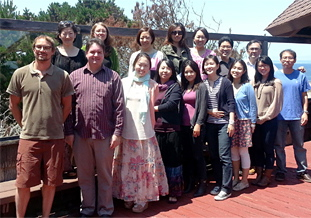Last week, I embarked on a journey to Monterey in California to present the contents of my dissertation project at the Korean Studies Dissertation Workshop sponsored by the Social Science Research Council and the Korea Foundation. The workshop was held at the Asilomar Conference Grounds at Monterey, where wildlife on the coasts of the Pacific Ocean were kept alive and healthy. I also found Monterey interesting, with the traces of John Steinbeck’s footsteps along the Monterey Aquarium, the Old Fisherman’s Wharf and Cannery Row.

Presenting dissertation work at the 2013 Korea Studies Dissertation Workshop, Asilomar Conference Grounds, Monterey, CA, United States (July 1-5, 2013)
While the workshop was quite fruitful for advancing my own work and building new networks in the field of Korean studies, certain things were still on my mind as I landed at Boston Logan Airport on my way back. I don’t necessarily categorize myself as a Korean studies person, as my research focuses more on U.S. bilateral relations with Northeast Asian states and intra-regional political economy of Northeast Asian states. But understanding Korea on a broader scale and knowing the Korean economy in full detail is quite important to my career. Having put a considerable time and effort into trying to balance myself in each of the three fields – China, Japan, and Korea, I have been witnessing a strong imbalance in the field of Korea studies in terms of disciplines in comparison to other country fields. The imbalance was twofold: one between the humanities and the social sciences, and one of gender imbalance. Of the 12 participants (of which 10 were females), I was the only hard social sciences person – and the only political economist. All other participants came either from anthropology, history (subcategorized mainly into art, architectural, and medical history). Simply put, the academic atmosphere of Korean studies that this one example portrayed, did not look healthy in the long-term.

Participants at the SSRC KSDW. Excluding the professors (of which the majority is male), most of the students were females, including myself.
As much as South Korea has advanced into the global economy, studies on Korea would benefit greatly from the expansion of studies in economic history, law, politics, economics, and sociology. In order to understand what Korea is all about, we also need a broad-ranged, balanced views from ALL disciplines – be it humanities or social sciences; both from females and males, that would propel the discussions going on a level playing field. Some may retort that nothing is balanced or equal in the academia, but blaming it on how the system looks like right now and heading toward a different view and convergence are totally different things. It is also crucial to understand Korea in the context of domestic dynamics as well as in the context of global mechanisms, inside and out. Any effort in moving the studies forward in this manner would do a good favor to the discipline. If the two trends of imbalances persist in the coming decades, the field will become less promising than it is now.
